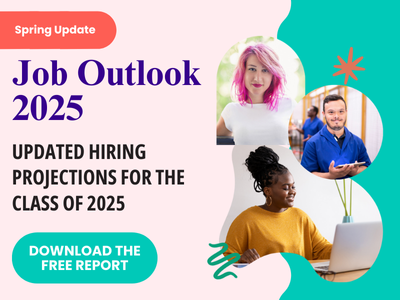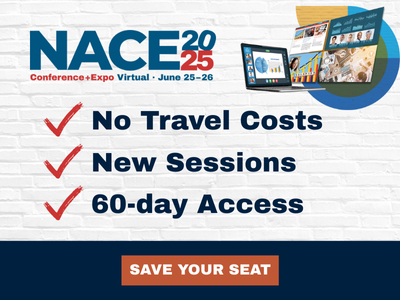The University of North Florida (UNF) has historically offered innovative programs, services, resources, and events to ensure students are successful and career ready by the time they graduate. This approach led leadership to embark on a new path at the intersection of UNF’s core functions and
NACE’s career readiness competencies.
“Students’ career development is everybody’s business on campus, with our career services department functioning at the core,” says Vivian Senior, senior director of student engagement in UNF Career Services.
“Career services, a part of UNF’s Office of Student Success, integrates a holistic developmental approach to the student career and professional development experience. This starts with helping students identify suitable majors and career options and continues with teaching employability skills and providing various modes to connect with employers for internships and jobs.
“Reviewing the alignment of our core functions with NACE’s career readiness competencies prompted me to assess, enhance, and elevate our approach.”
The result was the development of OspreyPro, a comprehensive, local program based on national-level research and standards. OspreyPro is a progressive, four-level program targeting students’ career and professional development cycle throughout their college career.
“The program’s name embeds our university’s mascot,” Senior explains.
“It communicates that we envision guided growth and the transition from student to professional. Progression through all levels is key, as students’ demonstration of the competencies positively impacts their internship and other practical experiences. OspreyPro cultivates proactive students who position themselves as employees of choice to future employers.”
Details of the OspreyPro Program
Through OspreyPro—which is delivered online—career readiness competencies are integrated within four levels, each prompting students to “read, view, and do.” Students read or watch customized or linked content and complete assignments and activities to develop and demonstrate knowledge and skills.
“During the summer of 2024, Manny Velasquez, director of career education, assumed a lead role in further developing content to provide a meaningful experience for students,” Senior says.
She notes that digital badges are a significant program highlight. As each level is completed, students gain a digital badge, culminating in receiving the OspreyPro meta badge after the fourth level.
“Badges may be displayed via social media and name badge ribbons can be worn at career fairs and events, signaling that students invested in their career and professional development,” Senior explains.
Another highlight is the program’s faculty partners. While some students may voluntarily complete the program in self-paced mode, most complete all or select levels as a part of class requirements over the course of a semester.
“We intentionally promote the program campus-wide as a natural complement to respective course requirements,” Senior says.
“Elements of each competency are already embedded in the overall higher education experience, so our ‘career in the curriculum’ approach positions us to meet students where they are to enhance and elevate their career and professional development.”
NACE competencies are taught through four levels, which also represent the badge labels students achieve:
- Career Education—Students enhance decision-making on majors and careers using job market data and salary insights, while encouraging self-reliance in career development. Students complete career assessments, explore majors and career options, research job market data, create a profile in UNF’s internship and job-search platform, and start the development of a career action plan.
- Professional Skills—Students develop skills in professional communications, networking, and interviewing. They develop resumes and interviewing skills via an AI platform.
- Professional Prep—Students learn factors impacting digital branding, professionalism, workplace etiquette, and emotional intelligence and plan next steps toward employment and/or grad school. They develop online and in-person presence and networking skills, as well as develop soft skills related to workplace performance when completing internships and other practical experiences.
- Career Readiness—Students attain real-world experience and refine career/professional skills and action plans, while boosting critical thinking, communication, teamwork, leadership, and time management. Students secure internships, participate in experiential learning opportunities, and reflect on how these experiences prepared them to enter the workforce.
For the Professional Skills, Professional Prep, and Career Readiness levels, students are required to attend one or two career services events, while revisiting select areas, e.g., updating their resume and profile in UNF’s internship- and job-search platform, enhancing interview skills, and more.
OspreyPro’s Evolution, Champions, and Assessments
Senior developed the original version of OspreyPro more than four years ago. The initial version had modules for each of the eight competencies and was later revamped to include the four progressive levels that aligned with students’ career development cycle over the course of their college career.
“This format allows for the integration of multiple competencies at each level,” Senior explains.
“Since the core vision, format, content, and assignments for the program were already established, it didn’t take as long to develop. Over the course of six months to a year, content was either updated or developed.”
Senior and her team merged in an existing career readiness initiative required for all first-year students for the first level. Meanwhile, it piloted Level 2 and Level 3 across the summer and fall 2024 semesters, with Level 4 rolling out for the Spring 2025 semester. The full OspreyPro program was launched in February 2025.
Senior says the program has many champions, including “UNF President Dr. Moez Limayem, who has championed students building and gaining professional skills throughout their college career, and Dr. Susan Perez, associate provost, who has promoted the program to campus leadership at all levels and advocated to secure funding for the AI platform integrated into the platform allowing us to scale the program.”
In addition, she cites faculty partners integrating the program as class assignments are key to its success and UNF’s Digital Learning and Innovation office, which has made contributions like automating the process to award badges to students as they complete the program.
Valuable contributions have been made by the students, themselves. For example, students in UNF’s fall 2023 undergraduate Career Planning & Professional Success course participated in validity testing for the
NACE Competency Assessment Tool.
“With the relatively recent launch of this tool and our recent full OspreyPro launch, we are integrating the tool as pre- and post-assessment of students,” Senior says.
“We are also including mechanisms for students and faculty to evaluate OspreyPro. Career and professional development content is widespread through various sources, and I have a particular interest in ensuring students’ OspreyPro experience enhances their knowledge and skills.”
Senior says that data collection and evaluation are forthcoming at the end of the first full cycle. However, to date, she says more than 8,000 students have achieved the first-level badge, which includes knowledge checks and a quiz to ensure students were fully and successfully engaged with learning content.
“We are currently focused on students’ continuity in completing remaining badge levels,” she notes.
“Close to 300 students are currently spread across completing levels 2 to 4 during this spring 2025 semester. Due to current faculty partnerships and pending confirmations, we anticipate more than 900 student participants for levels 2 to 4 for the upcoming academic year.”
Steps for Program Success
There are key steps for career centers interested in developing a similar program to take, Senior says. First, it’s important to start with securing support from campus leadership to help promote and fund the program.
“When developing a program relying on active participation by internal and external partners, I am always guided by depth and simplicity,” she notes.
“The program must have substantial content to develop and advance students’ knowledge and skill attainment, while also ensuring a smooth process to complete the program, and for campus partners to understand, embrace, and integrate.”
Senior suggests starting in pilot mode with a smaller group of faculty partners and students, which allows time to assess and adjust the content, process, and any tools used to facilitate the program.
“Most career centers do not have enough staff to review and evaluate all student assignment and activity submissions. Think long term, considering growing program participation, and ensure you have the technology needed to automate processes,” Senior recommends.
There’s also a possibility that not everyone will initially embrace the program. In this case, Senior advises program organizers to start with a core group of faculty partners who often become voluntary ambassadors, encouraging participation with faculty colleagues.
“Develop a communication plan not only to promote the program, but to manage expectations for any specific discipline customization requests,” Senior says.
“It’s challenging for a program on this scale to focus on select disciplines, careers, and industries. However, ensure you include and communicate the various tools students gain through the program, allowing them to access targeted insight, knowledge, and data.”







